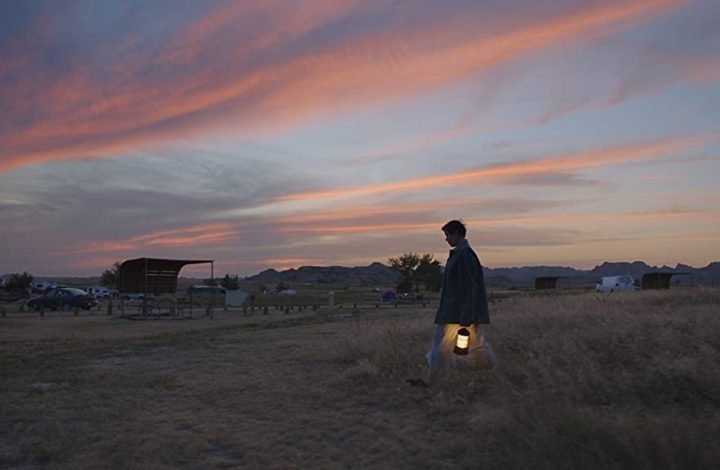
MPAA Rating: R | Rating: ★★★★★
Release year: 2020
Genre: Drama Director: Chloé Zhao
Philosopher Paul Ricoeur’s particular approach to phenomenological hermeneutics has been described as a kind of detour and return, a “second naivety” which comes after a long, critical journey through the images, symbols, and stories of the topic at hand. It requires taking an initial look at an object, then going on a quest through the various conflicting subjective interpretations of that object, recognizing that the stories and encounters shape our own interpretations of the world, which allows us a fresh insight when we return to where we came from. Filmmaker Chloé Zhao’s Nomadland could also be described as a meditative “detour and return;” it is an achingly moving work of transcendent cinematic art which is, paradoxically, humble and confident, fanciful and true, a film of realist authenticity and formalist wonders. It is an elegy for America, both the land and the myth, told and sung by the pilgrims who travel within its borders and experience both its beauty and neglect. It is, in short, a masterpiece.
Nomadland is writer-director-editor Zhao’s third feature-length film following her 2015 debut Songs My Brothers Taught Me, and the masterful neo-Western The Rider in 2018 (my review). There was an intimacy and tenderness to those earlier films that is also on display in Nomadland; it’s a noticeable, sincere love for every person, every hill, every animal, every rock. Where The Rider centered on the rodeo cowboy culture of the badlands of South Dakota, Nomadland presents the lives and narratives of the nomadic van-dwellers living in the American West in the post-Great Recession era. The script is an adaptation of Jessica Bruder’s book which reports the details of these wandering lifestyles. Nomadland finds its narrative anchor in Fern, portrayed with vigor and vulnerability by Frances McDormand in what is perhaps my favorite performance of hers since Fargo (yes, I recognize that this is quite the claim). The opening titles reveal that the small town of Empire, Nevada has turned into a ghost town in lieu of the 2008 American economic crisis. With the loss not only of job and home, Fern also loses her husband to illness, finding herself alone in a literal and spiritual wilderness.
Yet, as the biblical narrative demonstrates, the wilderness can also be a place of honing and refining; a place of death that can somehow miraculously birth new life; a place of preparation and peace even in the midst of wandering and wondering. Fern wanders this wilderness of America with a quiet gusto, going from job to job, location to location, living in her rusty white van she’s lovingly (and appropriately) named “Vanguard.” As she travels, she makes friends and companions along the way, fellow nomads who have also experienced the kind of holistic loss and trauma she’s encountered. Like The Rider, Zhao has peopled Nomadland with real-life individuals who play semi-fictional versions of themselves: Fern’s friend Linda May is really Linda May; nomad guru Bob Wells is really the real Bob Wells; the kindly Swankie is portrayed by Charlene Swankie; and so on. The only other professional actor I discerned is Dave, played by David Strathairn, who, like McDormand, gives such an understated and affecting performance that one forgets he is an Oscar-nominated acting behemoth. Where some might balk at this quasi-factual filmmaking approach—why include fictional characters played by stars like McDormand and Strathairn? Why not just make a documentary about the real-life nomads?—Zhao’s nuanced and generous approach to the filmmaking craft makes every scene feel truthful, every edit deliberate, every image chosen with care. Indeed, Zhao is a careful filmmaker, not in the sense of cautious or overly-controlling, but in the sense that every single part of the film has her distinctive touch precisely because she deeply and evidently cares about cinema as art form.
Zhao also channels the spirit of Terrence Malick in Nomadland, from the ethereal hovering “pneumatological” camerawork, to the elliptical editing which throws us in medias res into new locations and landscapes, to the emphasis on natural golden hour sunlight and glorious pink-hued sunsets. Nomadland wanders the same American landscape as Badlands, Days of Heaven, To the Wonder, and Knight of Cups, asking similar questions about being-in-the-world, human meaning-making, and what Walker Percy calls “the search” in his novel, The Moviegoer. Yet what distinguishes Zhao from Malick is that one gets a sense that while both are awestruck at the beauty of existence itself, the latter is ceaselessly searching and never quite comfortable in this world, whereas the former has found some kind of mysterious rootedness or peace. A “second naivety,” if you will; a willingness to comfortably accept the mystery of it all, not because she’s quit searching, but because she loves this present moment of the journey and wants to linger awhile. Fern, too, must often make decisions whether she should stay or go, settle down or keep moving. This internal oscillation keeps us engaged as the narrative progresses, as we’re never entirely sure where it, or Fern, are headed next. Yet there’s a kind of comfort that comes with this film too, because we as the audience are in capable hands (Zhao’s hands) for the journey. And so I believe I will return to this film, again and again, like seeing a familiar landmark which reminds me of home. Nomadland reminds me of the simple truths which seem all the more profound on the far side of critical contemplation: that every human being matters; that finding true community is a beautiful gift; that nature has a miraculous way of healing; and that our very lives are journeys worth sharing.
IMDB Listing: https://www.imdb.com/title/tt9770150/
Excellent must watch